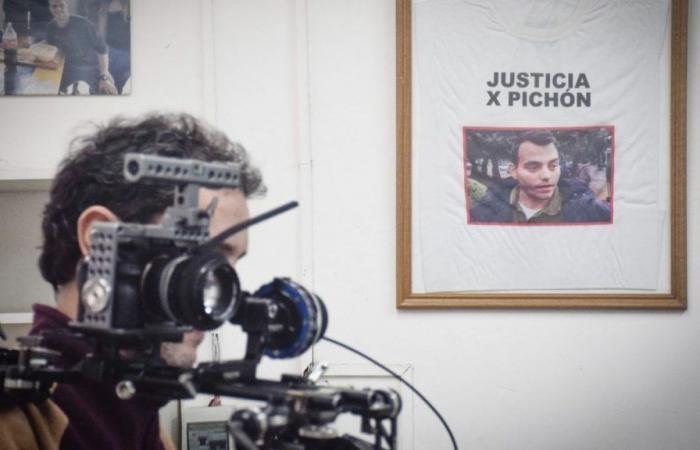At the Oroño and Pellegrini roundabout, the name of Pichón made with flowers is a daily reminder, a gesture of collective memory. And it was that call that Carla Ciarrochi, director of “A garden for Pichón”, the documentary about the Gerardo Escobar case, which premieres this Friday the 28th, at 8:30 p.m., at the Cairo cinema, with free admission.
Produced by Lluvia Films, The film recovers the story of Pichón, a municipal worker from the General Directorate of Parks and Walks, who at the age of 23 was disappeared and murdered in 2015 in Rosario. Qor the crime, which had national resonance, bouncers from the bar where he was last seen and police officers were investigated, but the Federal Court ruled there was no merit, and the cause went unpunished.
The documentary, and declared of municipal interest by the Municipal Council, presents a portrait of Escobar through the voices of his close environment, and highlights the living memory of his figure, while highlighting the long and persevering struggle of those around him. for justice. For Carla, the initial kick-start to become interested in documenting this story was the very forcefulness of the case, but first and foremost the homage of the roundabout that her colleagues have been holding for nine years.that daily insistence of tenderness and militancy.
“They did it a month after his murder, for Pichón’s birthday, and they maintain it until today. They told me in a fragment that was not in the documentary: ‘As long as we are here, it will be there. I spend a lot there during the week and I always contemplated it, admired it and thought it was a very luminous gesture of love and memory. He is alive there, looking at the Courts, looking at the sun, looking at the river. The starting point was to see that memorial and think about looking for the companions who maintained it. Because it is a collective gesture, a cry for justice, which is there challenging everyone,” said the director in dialogue with La Capital.
Before embarking on the documentary, Ciarrochi came primarily from the world of literature. Although he is part of the Board of Directors of the emblematic Cine Club Rosario, and for several years he has attended the audiovisual writing workshop of Irene Ickowicz (author of films such as “Kisses on the forehead” and “Botín de guerra”), he had not thought about embarking on the path of filmmaking. When the project was the winner in the Production category of the 2022 Development Plan of the Ministry of Culture of the Province of Santa Fe, the dream took shape.
“I spent a year writing the script while doing research. First I went to Parques y Paseos to ask and they took me directly to the office where Pichón worked and where his colleagues are still working. Then I contacted Luciana, the sister. One contact led to another, and I reached the teacher of the Gardening School, the teacher of the primary school for adults. I met her mother and I chose not to expose her in the documentary, but I talked a lot with her, and she told me things that Luciana later recovered in the documentary,” explained Carla, who, prior to this process, only knew about the case through the media and the recurring presence on the street of his family and friends.
After this writing and development work (in collaboration with Ickowicz and the workshop colleagues), Virginia Giacosa in production, Sebastián Pancheri and Federico Barbara in photography and camera direction, and a great technical team of young professionals from the city. The director highlighted the joint effort of those who made the film possible: “There was great teamwork, everyone read the script with me, we thought about the shots and I think they understood it very well, they were able to look with me at what I had written, and we managed to bring it to the screen,” he stated.
>> Read more: A documentary about the emblematic Vicentin case premieres in Rosario
In memory of Pichon
A particularity of “A Garden for Pigeon” is its focus on Gerardo’s memory and not on the complexities of the police and judicial case. “I thought a lot about how to put together the story so that it is not a journalistic note, or something cold. With what images, with what sounds, with what colors to show it,” Ciarrochi said.
“Memory is something that interests me a lot in general, and I also believe that it is something that this town learned: “that memory is important, that we have to talk about things, think about them collectively, rationalize them, mourn them, bring them to the present. Not forgetting the things that have happened to us as a society, like the case of Pichón, who is one but could have been many others. I went to look for that intimacy, that detail, that memory that people carry,” shared the director.
“I chose not to get into the rawest part, although Luciana tells quite crudely everything that happened. But I don’t want to get into the hard details of the trial, the accused, or how the case ended legally, although these are things that I investigated but I chose not to focus on them. When I started writing, I realized that it was okay for me to embrace what the people around Pichón maintain is a bright, colorful memory. We filmed everything during the day, I wanted it to be colorful, for there to be sun, for there to be flowers,” Carla added.
Trailer A garden for pigeon
The documentary, then, takes place at length in the corners of Parque Independencia that Escobar took care of almost daily, and around the house of his sister Luciana, who left the city a few years ago to live closer to nature.
“I showed Luciana each part, and a first cut that was completely different. I also showed her raw material at the time so she could see what we filmed in Rosario, who had participated, what they had said,” Ciarrochi said about the closeness of Pichón’s family with the documentary and its development. According to the director, the sister traveled to be present during the premiere at the Cairo cinema and also accompany her mother at the viewing.
“I think that It is told as they tell it, with a lot of love for Pichón and with the shared anger that there is no justice and there should be. And as Luciana says at one point, the certainty that this should not have happened,” Carla added.facing the imminent screening.
Finally, the director highlighted the importance of support from different levels of the state to sustain the national audiovisual industry and be able to carry out projects like this documentary. “For me and for all the people I know who want to make films, it is impossible to do these things without contributions like the one I had. It is essential that the State is present, promoting our culture to tell our stories as a society. And cinema in particular needs it because a lot of people work there,” Ciarrochi concluded.






